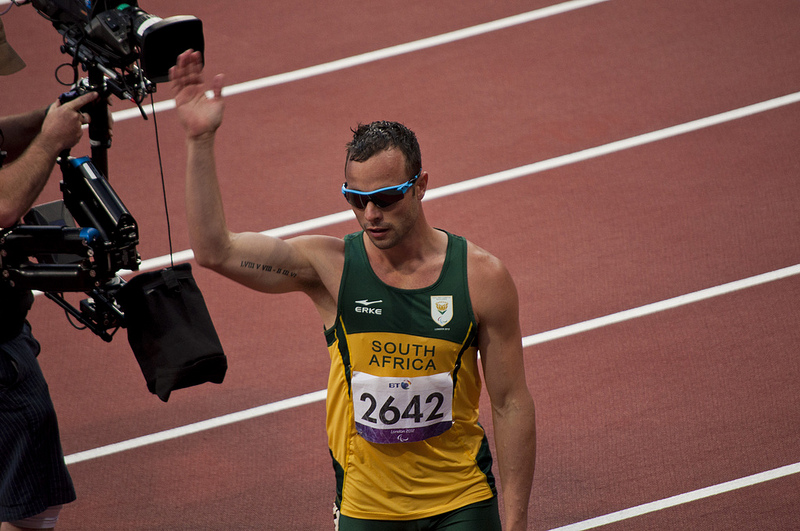Violence against women is a global concern. The issue took centre stage as Oscar Pistorius was tried for the murder of his girlfriend a beautiful young model on the verge of a fabulous career.
Unfortunately, due to past troubles arising from the apartheid era, South Africa no longer has a jury system (see here). The verdicts were delivered by a single judge who had the assistance of lay assessors. The world was watching as judge Masipa delivered a reasoned judgement setting out her findings in fact and law.
It was a fantastic advert for court TV, but more of that later. In determining guilt or innocence, the judge sensibly started with the defendant’s account, recognising that, as in most murder trials, the only person alive who really knows what happened is the defendant.
Pistorius was a poor witness who gave inconsistent evidence but lies cannot prove guilt. Many innocent men lie for all sorts of reasons, especially when on trial for grave allegations. The law recognises this.
Murder must be proved beyond a reasonable doubt and here the prosecution case was based on screams, lights and noises that could not give her a concrete timeline. The fact that Oscar Pistorius picked up a loaded gun and used it is not, in law, the end of the matter.
The prosecution have to prove those physical elements. They also have to prove mens rea – that is the state of mind of the defendant at the time of the killing. For premeditated murder (charged as count one), the prosecution had to prove intent. An intention can be inferred from all the circumstances. This includes the fact that Oscar Pistorius took a pistol, loaded with expanding bullets and pulled the trigger four times.
However, it is all the evidence that needs o be considered and Oscar Pistroius is an emotional character. This expressed itself in overbearing and selfish behaviour towards the deceased during their relationship. She wrote Whats App messages that he scared her sometimes.
Many men frighten their partners. The figures on domestic violence are appalling but not every violent partner is a killer and here, the judge was satisfied that the distress shown by Oscar Pistorius at the scene was genuine.
Not enough facts
Pistorius told the first witnesses on the scene that he believed he had shot an intruder. The judge took the view that such a reaction was almost impossible to fake. She accepted his explanation that he reacted impulsively as a ‘fight rather than flight’ person. Fighting in law does not necessarily denote intent.
In the judge’s view there were ‘simply not enough facts’ to prove murder. She was however satisfied that his actions in taking up a gun rather than alerting security were unreasonable. This means that the prosecution had proved he was not acting in self-defence or defence of others or property.
She recognised his vulnerabilities as a person with disabilities but noted that many people are vulnerable and, even in South Africa where tensions run high, this does not justify an immediate armed reaction.
She found Oscar Pistorius guilty of culpable homicide and he will be sentenced on October 13. She also delivered mixed verdicts in various firearms charges but it is the homicide that has caused such outrage. Social media commentary suggests individuals largely disagree with her verdict. Ultimately the disputes on twitter tend to show why there was a reasonable doubt as there are differences of opinions over the facts of what happened and the judge was bound to deliver a verdict based on those inconsistencies. Even a jury would have found it difficult to be sure. It is rare to find such a distressed defendant and my guess is a jury may well have reached the alternative verdict as well.
Finally, it is worth noting that for lawyers there are numerous points of interest outside the elements necessary to prove murder:
- The advocacy by prosecution counsel was old fashioned and aggressive. It is perfectly possible to take a witness to pieces without shouting and the attack dog approach clearly backfired as it exposed the defendant’s vulnerabilities rather than the issues. There are toolkits on dealing with vulnerable witnesses available at www.theadvocatesgateway.org. My view is that these should now receive global recognition.
- The cost of the defence seems to have been remarkably high if reports that the defendant sold his house to pay the fees. The need to provide a bespoke service for all defendants, not just the rich ones is an issue that needs to be confronted so that anyone can have the service of a quality advocate regardless of the charges.
- The jury system is a much better option than a single judge. Provided cases are properly presented, it avoids individual attacks on judges and keeps the community in the system. The debate between 12 people in a jury room gives a far more satisfying verdict than a legal judgement which has to be delivered like a complex exam paper. Of course, juries need more information than they currently have. Some selection is a good idea and the use of full technology in court is long overdue. That South Africa removed this system is a great sadness. Nor is an inquisitorial system the answer since advocates can ask the questions based on proper case theory rather than fishing for possibilities. The current trend to restrict jury knowledge is unnecessary. Most miscarriages of justice arise from what the jury didn’t know rather than what was explained. I’m told even the ICC have referred to ‘Mr Google’. The source of the evidence goes to weight not finality. The real changes necessary in the modern world is to trust juries with much more information to make sure they have the tools to make the right decision – with global communication this has got to be possible – even in South Africa.
- The real winner seems to be the televising of a trial. Most cases are never reported. Those that are usually suffer from reported comment. To see pretty much the whole thing was compelling and informative. A Bailey judge in the UK always explains that the criminal justice system belongs to the public and where the jury are not involved; at least here there was the live TV.
My view? Assuming the judge heard all the available evidence and we don’t hear that some further error was made or matter left undisclosed, justice was done and seen to be done. It may or may not be the truth, but on the available evidence, the important standard of proving serious criminal charges beyond a reasonable doubt was maintained.
In addition, South African householders were sent a message not to respond to intruders with firearms and overbearing boyfriends ought to understand that they will be put on trial for violence, even if they are famous.
The system in any country is a human system. It is fallible but we should at least welcome that a dignified and intelligent black woman judge was appointed and had the courage to make tough decisions in a terrible case. South Africa’s continuing gun crime woes have been exposed and Oscar Pistorius clearly needs therapy. With time and effort these can be fixed. Nothing can bring back Reeva Steenkamp and my last thought is for her Mum.








